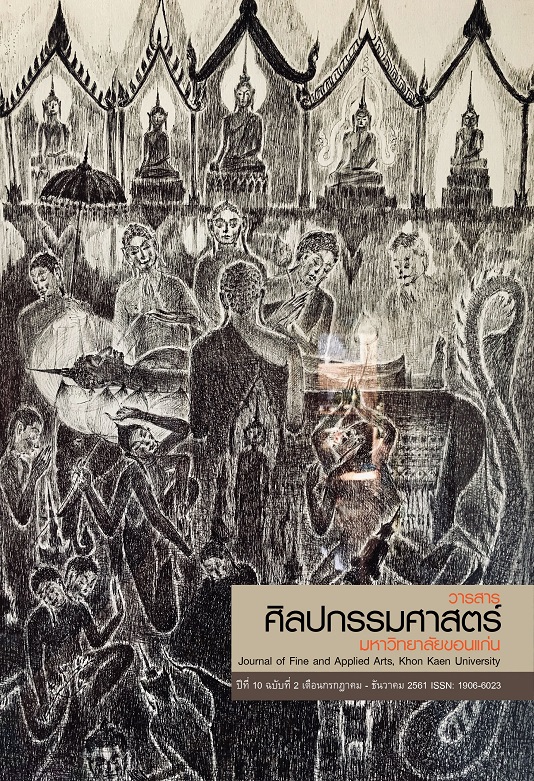The Development of Training Modules for Elementary Music Teachers, Grades 4 - 6 on “Teaching Music Based on Kodaly Principles and Brain-Based Learning Theory”
Main Article Content
Abstract
The purposes of this study were 1) to develop the training modules for elementary music teachers, grades 4 – 6 on teaching music based on Kodály principles and Brain-based learning theory (BBL), 2) to study effectiveness of the training modules. Participants were 14 elementary music teachers, grades 4 – 6 of the Potential Development Project of Elementary Teachers and Administrators of the Institute for Gifted and Innovative Learning (IGIL), Thailand. Three types of research instruments were: 1) the music teaching comprehension test, 2) the observation forms, and 3) the questionnaire. The music teaching comprehension test was used to measure teachers’ comprehension of music teaching before and after the training program. The observation and the questionnaire forms were used to collect teachers’ behaviors and satisfaction towards music teaching after 3 months of training. The t-test and One-way ANOVA were used to analyze pre – posttest comprehension in music teaching. Descriptive statistics were used to analyze teachers’ behaviors and satisfaction.
The results showed that the 12-hour training modules (2-day program) developed based on Kodály principles and BBL theory consisting of 1) Kodály principles: singing quality, music notation reading along with hand signs and rhythmic syllables, and the organization of music subject matter; 2) BBL theory: application of BBL abstract concepts, active participation, relaxed alertness of teaching. The program handout consisted of 8 parts. In terms of effectiveness of the training modules, results indicated that there were significant differences between pre – posttest scores of comprehension of music teaching (t = -9.179, df = 13, p < .05). For the average scores, the posttest scores (M = 12.71) were higher than the pretest scores (M = 7.71). The results of the follow-up, consisting of the aspects of teacher, teaching, student, and training program, showed that (1) for the aspect of teacher: the average of teachers’ opinions towards the arrangement of music activities level (M = 4.20, SD = 0.63), and the understanding of Kodály principles, especially the concept of sounds before signs (M = 3.70, SD = 0.67) are in the high level; (2) for the aspect of teaching: the average of teachers’ opinions towards the application of music teaching technique to enhance students’ learning (M = 3.90, SD 0.74), and the abilities of teaching music as of the principles (M = 3.90, SD 0.57) are in the high level; (3) for the aspect of student: the students were the center of learning is on the high level (M = 3.50, SD = 0.97), and the students had positive feeling, happy and enjoyable in learning music is on the fair level (M = 3.40, SD = 0.70); (4) for the aspect of training program: the training was able to develop the music content (M = 4.70, SD = 0.48), and enhance effectiveness of music teaching (M = 4.60, SD = 0.52) are on the highest level.
Article Details
Content and information in articles published in the Journal of Fine and Applied Arts of Khon Kaen University is regarded as the opinion and sole responsibility of the author(s) directly; therefore, editors are not obliged to agree to or share any responsibility with regard to the content and information that appears within these articles.
All articles, information, content, image, etc. that have been published in the Journal of Fine and Applied Arts of Khon Kaen University is the copyright of the Journal of Fine and Appllied Arts of Khon Kaen University. Any person or organization who wishes to distribute all or parts of the articles for further dissemination or other usage must first receive permission from the Journal of Fine and Applied Arts of Khon Kaen University before proceeding to do so.
References
ณรุทธ์ สุทธจิตต์. (2561). สาระดนตรีศึกษา: แนวคิดสู่แนวปฏิบัติ. กรุงเทพมหานคร: สำนักพิมพ์จุฬาลงกรณ์มหาวิทยาลัย.
ณรุทธ์ สุทธจิตต์. (2544). พฤติกรรมการสอนดนตรี. กรุงเทพมหานคร: สำนักพิมพ์จุฬาลงกรณ์มหาวิทยาลัย.
Caine, R.N., & Caine, G. (1994). Making connection: Teaching and the Human Brain. New York: Addison-Wesley.


